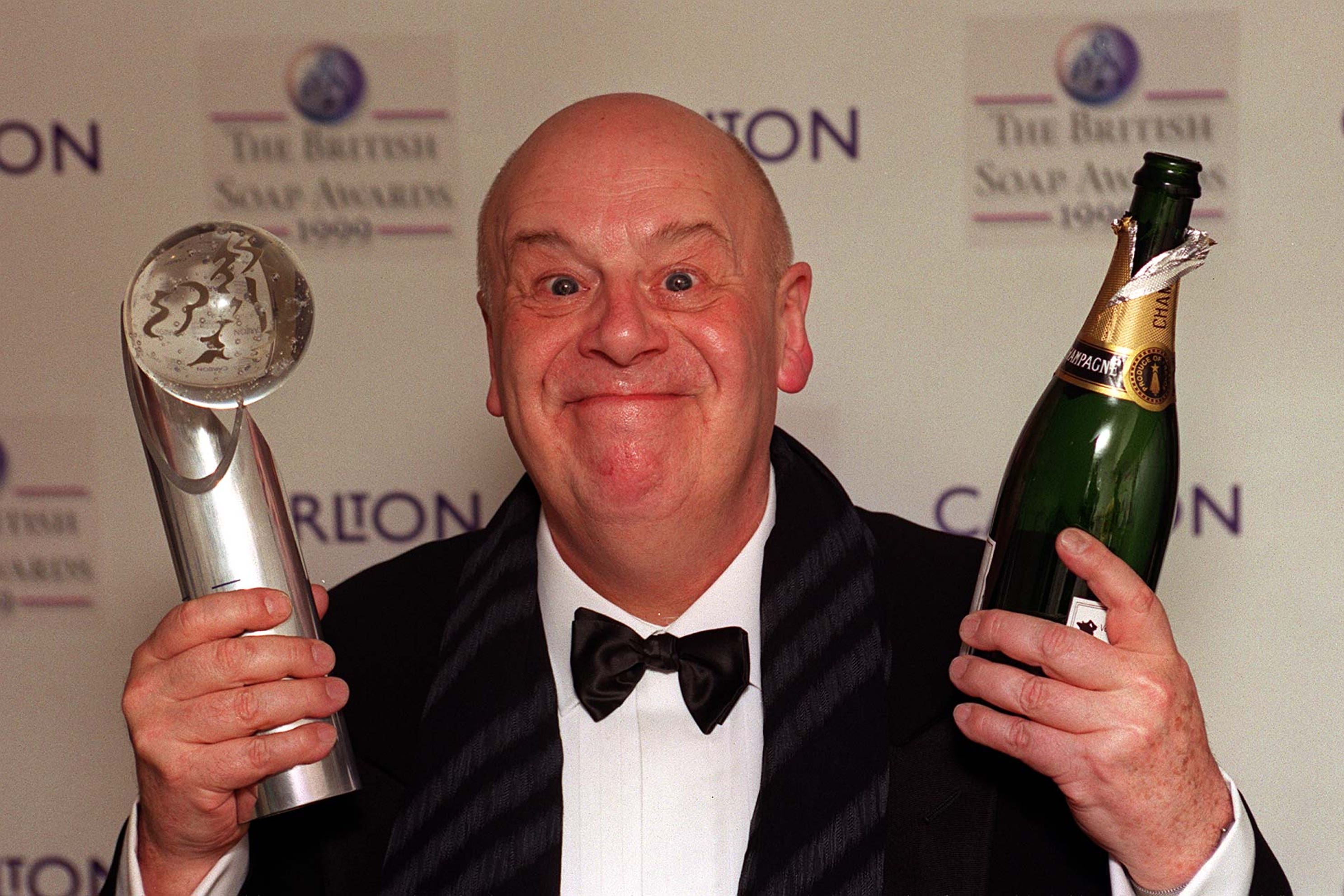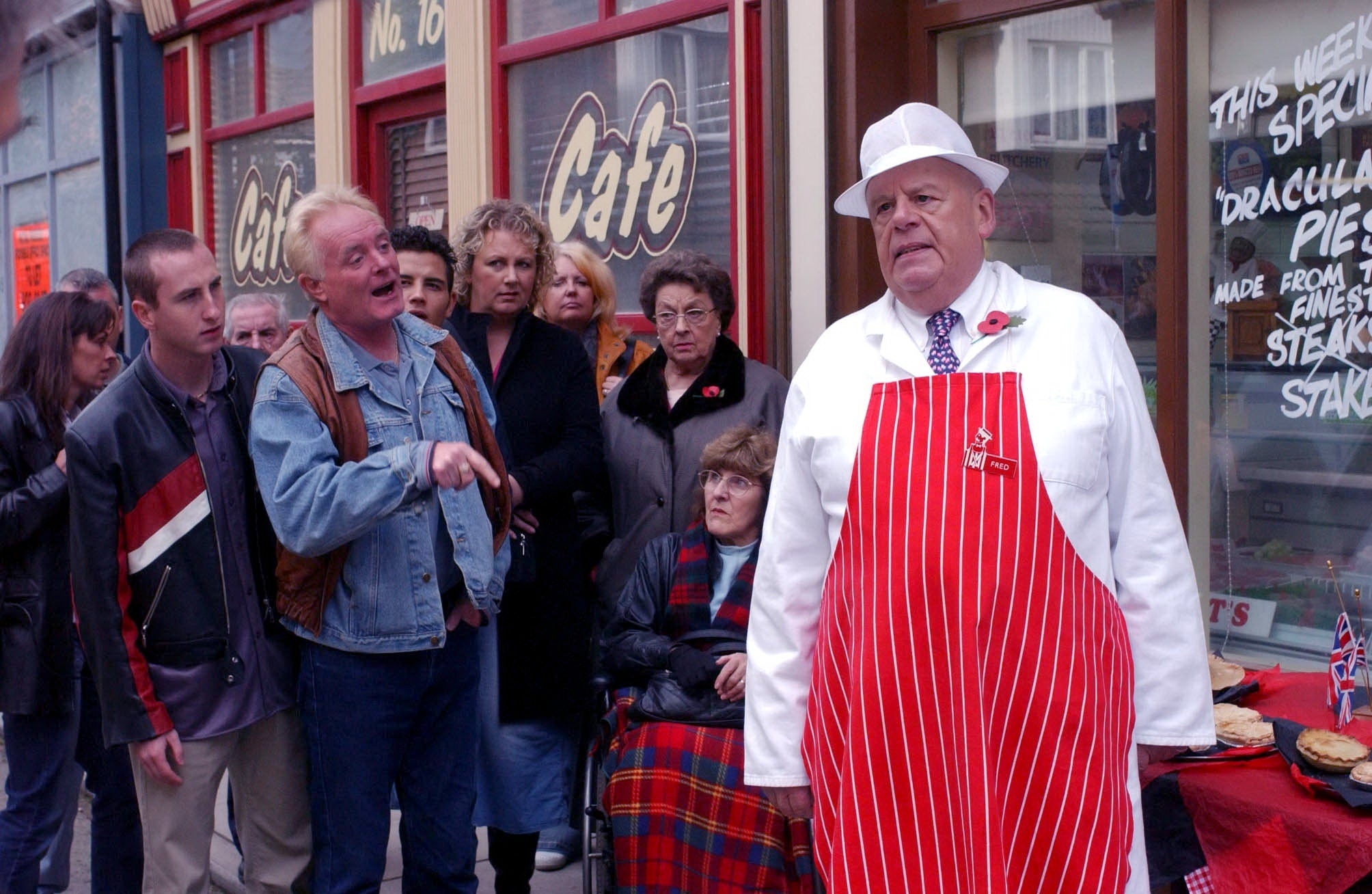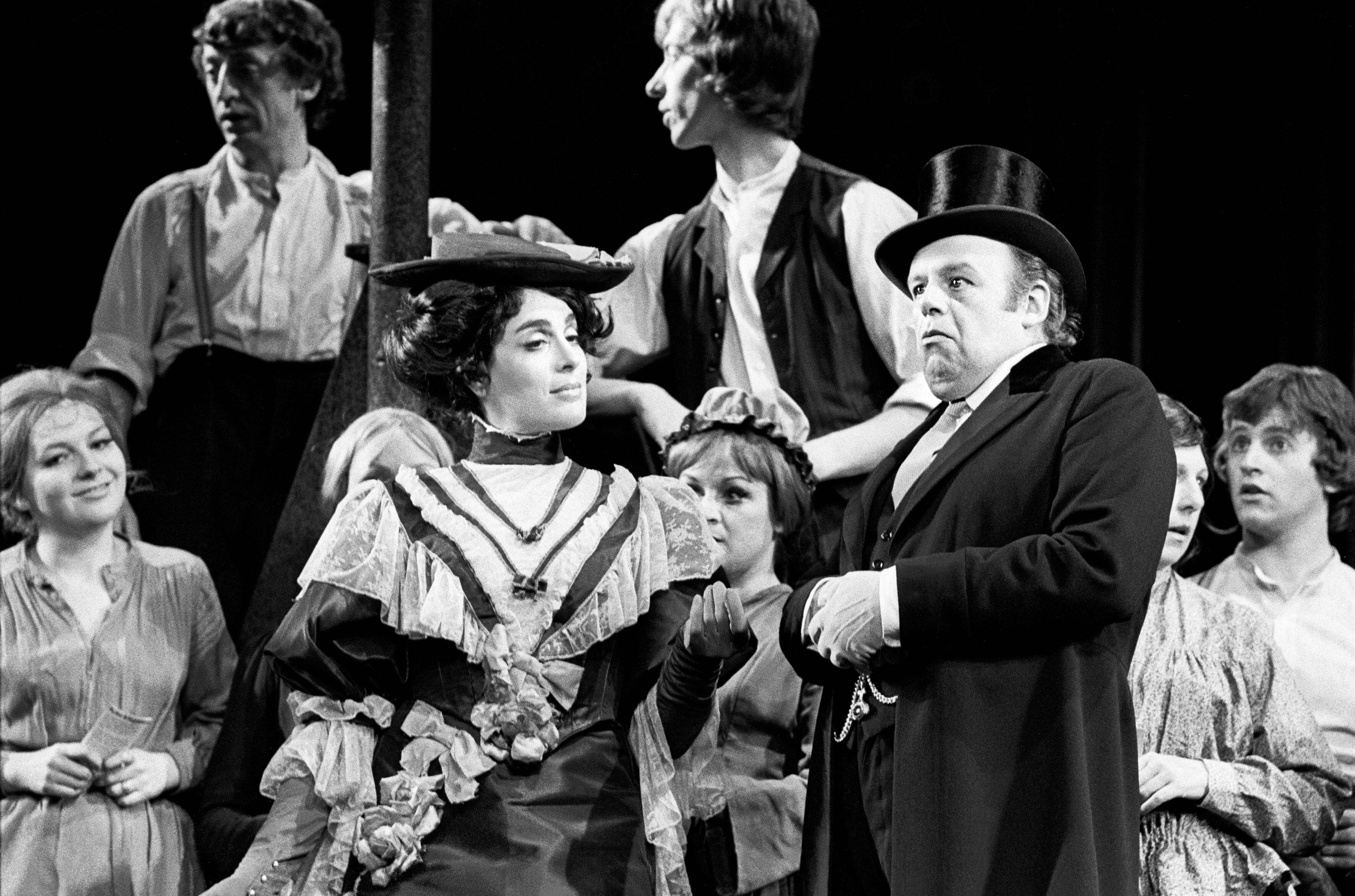John Savident: Bellowing butcher Fred Elliott in Coronation Street
From ‘A Clockwork Orange’ to ‘The Phantom of the Opera’, from Shakespeare to sitcom, Savident was the epitome of the versatile actor, writes Anthony Hayward. Being able to switch from the humdrum to the eccentric, and possessing a mastery of voices and speech patterns, he was a natural in all of his varied roles

After 45 years on stage and screen as a dependable character actor, often in authority roles, John Savident, who has died aged 86, gained his greatest fame as the brash master butcher Fred Elliott in Coronation Street.
The bellowing Fred was renowned for repeating sentences, usually joined together with the words, “I say.” Savident said he was influenced in this by both Foghorn Leghorn, the Looney Tunes cartoon character, and the way Lancashire mill workers spoke as they struggled to be heard above the noise of the looms.
Fred was first seen in 1994 on a trip to the fictional Weatherfield’s “twin” town in France to take part in a black pudding contest – threatening the twinning arrangement by trying to bribe a judge.
The widower showed a softer side when he proposed to merry widows Rita Sullivan (played by Barbara Knox) and Audrey Roberts (Sue Nicholls), but was knocked for six when both turned him down.
However, he proved a strong ally to Ashley Peacock (Steven Arnold), who believed himself to be Fred’s nephew but eventually discovered that the butcher was his father, from a broken relationship that resulted in Ashley being adopted by Fred’s sister.
Love eventually came to Fred when he married Maureen Holdsworth (Sherrie Hewson) – to the disapproval of her mother, Maud Grimes (Elizabeth Bradley) – but he was heartbroken when she left him after less than two weeks.
He tied the knot again, with Eve Sykes (Melanie Kilburn), and bought the Rovers Return for her to run – before discovering that she had never divorced her previous husband.
In 2006, Fred sold the Rovers and became engaged to Bev Unwin (Susie Blake) – only to die of a massive stroke on the morning of their wedding.
The screen death came after Savident announced he was leaving the serial to spend more time with his family, but he later said he had hoped that TV bosses would simply agree to reduce his filming commitments.

The many lives of Fred Elliott came to him as the climax of his own second life and career. He was born John Frederick Joseph Savident in St Peter Port, Guernsey, in 1938 to Karoline (nee Pfrinder), who was Swiss, and John Savident, a local fisherman.
When he was three, during German occupation in the Second World War, the family moved to Ashton-under-Lyne, Lancashire, where he attended the town’s grammar school.
From 1955, Savident enjoyed a six-year career pounding the beat with the Greater Manchester police. He trained alongside John Stalker, the force’s future deputy chief constable, and was stabbed in the arm while trying to break up a gang fight.
His interest in acting started with the Prestwich Amateur Dramatic and Operatic Society and he turned professional in 1961 on being offered the part of the Sheriff of Nottingham, opposite Max Wall, in a Robin Hood pantomime in Stoke.
He made his television debut in Redcap (1964), the series that shot John Thaw to fame as a military police officer, and subsequently played character parts on screen in popular dramas, from The Saint (in 1968) and The Avengers (in 1969) to The Professionals (in 1979) and Lovejoy (in 1993).
Savident had more prominent roles as George Askew, the Ashton family’s solicitor, in A Family at War (1970-72), the chief in the spy thriller Spyder’s Web (1972), Friar John in Romeo and Juliet (1978), Pythagoras in The Cleopatras (1983), the blackmailer Raffles in Andrew Davies’s BBC adaptation of Middlemarch (1994) and Sir Barstan Maxwell in Sharpe’s Regiment (1996).
His mastery of voices and speech patterns made him a natural for sitcom, in which he acted Sir Frederick “Jumbo” Stewart in the first series of Yes Minister (1980) and the aptly named Bishop Larkin, sending an eccentric elderly priest (Lionel Jeffries) to the Sisters of St Winifred convent as chaplain, in Father Charlie (1982).
During a break from Coronation Street, Savident took the role of a clergyman who shares the heroine’s stagecoach, held up by her runaway husband, in the miniseries The Fortunes and Misfortunes of Moll Flanders (1996), adapted by Andrew Davies from the Daniel Defoe novel.
Like Fred Elliott, this was another of Savident’s larger-than-life characterisations and, capturing the satirical nature of the drama, he gave a wonderfully comic performance in less than 10 minutes on screen.
On a bleak Lancashire location, he explained to me how he had conceived the role of the priest who warns Moll (Alex Kingston) of the dangers that London poses to a woman.
“He would have a particular way of speaking, rather like one or two MPs who pronounce their S’s as a ‘sh’,” said Savident. “There was also an old actor called Robert Atkins who spoke like that. It gives a richness and fruitiness to the character, especially when he talks in the stagecoach about all the wickedness Moll might encounter in London, all the sexual acts like ‘fornication, sodomy, fellatio and cunnilingus, tribadism, unbridled concupiscence on every street corner’.”
Savident, who had built up a solid reputation in classical theatre by then, enthused about landing the role. “Actors do television most of the time for the money, then dash off to the theatre,” he said. “But, when something like Moll Flanders comes along, you read the script and want to go for it.”

His career also extended to radio. He played a variety of villagers in The Enchanting World of Hinge and Bracket (1978-9), set in the fictional Suffolk village of Stackton Tressel and featuring Patrick Fyffe and George Logan as Dr Evadne Hinge and Dame Hilda Bracket.
In more than 20 films, Savident’s roles included the conspirator Dolin in A Clockwork Orange, senators in Galileo (1974) and Othello (1995), a mine manager in Gandhi (1982), Squire Thornton in The Wicked Lady (1983), an auctioneer in Hudson Hawk (1991) and Doctor Meredith in The Remains of the Day (1993). As a supporting actor, he was versatile enough to switch from the humdrum to the eccentric.
While horse riding in Epping Forest before travelling to Russia to shoot battle scenes for Waterloo (1970), in which he was cast as the Prussian General Muffling, Savident fell heavily and crushed his skull. “I was very fortunate,” he explained. “The brain surgeon said I could easily have ended up a complete cabbage after a knock like that.”
Later, he had another life-threatening experience. In 2000, he was stabbed in the neck during an incident at his flat near the Coronation Street studios in Manchester. Michael Smith, who was sentenced to seven years in prison, had claimed to be a drama student and the pair had gone back to Savident’s home to continue discussing theatrical matters. Once inside the flat, Smith produced a knife and demanded valuables and the keys to Savident’s sports car. During a struggle Savident’s neck was cut twice – one puncture missing his main artery by less than an inch. When Smith went to the garage to steal the vehicle, Savident was able to lock his attacker out and call the emergency services. He lost about two pints of blood.
On stage, Savident was a member of the National Theatre company in the 1960s and 1980s, and performed his one-man show Jerome K Jerome at the Cottesloe Theatre (now the Dorfman) in 1984. In between, he was at the Old Vic as Sir Toby Belch in Twelfth Night (1978), Tappercoom in The Lady’s Not for Burning (1978) and Shebelsky in Ivanov (1978-9).
A string of West End roles included Monsieur Firmin in the original production of Andrew Lloyd Webber’s musical The Phantom of the Opera (Her Majesty’s Theatre, 1987). His performance continued to earn him royalties for years as a result of his inclusion on the multimillion-selling soundtrack album.
He later returned to the stage as Henry Hobson in Hobson’s Choice at the Chichester Festival Theatre in 2007.
Savident married Rona Hopkinson in 1961. She and their children, Romany and Daniel, survive him.
John Savident, actor, born 21 January 1938, died 21 February 2024
Join our commenting forum
Join thought-provoking conversations, follow other Independent readers and see their replies
Comments